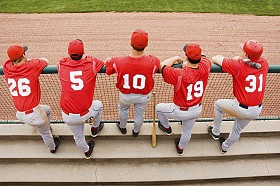At some point during a season, a team, regardless of the sport or level of play, will under-perform. Want proof? Consider the fact that even the1927 New York Yankees, still considered by many to be the greatest baseball team of all time, lost 44 games. There are many reasons, or at least explanations, why a team goes through a slump, but none can totally alleviate the pain and frustration a coach feels watching his team play at a level far below what they've shown they can achieve.
Every which way to lose
I guess I wasn't quite prepared when my team, the Yellow Jackets, began losing. Starting with a weekend tournament, and carrying over to the two league games the following week, they played poorly, losing five games to teams that were average at best.
During the slump, the team found a lot of different ways to lose: it made physical errors, mental errors, botched fundamentals, failed to hustle, and played with indifference. At times I wondered if the kids really wanted to be out there playing baseball. They seem excited before the game, and somewhat disappointed after the loss, but it's like they were playing a video game on their X-Box; as if they expected to press the reset button and simply reboot. I'm sure they realized it doesn't work that way, but after a week of losing I stopped assuming I knew what goes through the mind of a 12-year-old!

I wasn't so worried about adding five games to the loss column. I was concerned, instead, at the lack of spirit or engagement when things started to go bad. Nobody seemed willing to step up and make a play or rally their teammates. Despite my cheerleading, they seem content to quietly slide into what they believed was an inevitable loss, a self-fulfilling prophecy. Perhaps that's what was causing the slump, but I was a tough time bringing them out of that frame of mind.
If at first you don't succeed ...
It's not like I didn't try everything to halt the skid:
- I reasoned with them, explaining the different competitive advantages they had at the time, and how a little extra effort would lead to victory.
- I tried instruction, giving them specific tasks to do at the plate or in the field (like telling them, before the pitch, where the play would be) to be aggressive and hit the first strike they saw, or move up in the box against a slower pitcher.
- I re-stated my expectations and how they weren't meeting them.
- I attempted joking with them, laughing about their lack of enthusiasm; hoping they would see it in a different way and change.
- I juggled the lineup, both at the plate and in the field.
As the pile of miscues continued to grow, a desire to yell and scream began to well to the surface. I wanted to shout, "You are embarrassing me!" When they made five errors and only scratched out three hits against a team that had won only three games all year and featured a pitcher who looked like he'd never been near a mound before, I began to believe that it was I who had failed: failed the kids, parents, and, perhaps, even my country! After all, if we had a superior team, what other explanation could there be? It had to be the coaching. Or at least that's what I was thinking.
And if that's what I was thinking, everyone else must have been thinking the same thing, right? I imagined the parents were saying to each other, "This is awful. What are these guys teaching the kids at practice? Whose bright idea was it to have these guys coach in the first place? Jeeze, even I could tell the kids to hit the cutoff man." Fortunately, the parents on my team, at least, were understanding and supportive. More than likely, they were saying, "What a game. Wow. I can't believe we lost. The kids were really bad today. Oh well, they're 12 years old. Who is up for dinner?" But that was cold comfort me, and it didn't stop irrational, insecure thoughts from popping to mind, especially in the middle of the night.
Coach's role
For the most part, I was able to resist the urge to yell at the kids. It wasn't easy, though. They weren't putting forth the effort, their performance was lackluster, they were indifferent, the results are poor, and I felt it all reflected poorly on my ability as a coach. Ultimately, though, I reminded myself that coaches can't want it more than the kids, that it was up to them to eventually rise to the occasion. My role was coach was to keep trying new things while continuing to support them by providing suggestions, instruction, insight, and motivation.
Enduring a slump undoubtedly would cause me psychological pain and even physical discomfort, but it was a big part of my job as a coach: to be the voice of reason and rock of support for my players. Remaining positive was how, I was sure, I would lead them out of the slump.
First in a three-part series
 Adapted from the book, A Perfect Season: A Coach's Journey to Learning, Competing, and Having Fun in Youth Baseball (Quiet Path 2010) by Dan Clemens. It is available at Amazon.com, Barnes and Noble, and other bookstores.
Adapted from the book, A Perfect Season: A Coach's Journey to Learning, Competing, and Having Fun in Youth Baseball (Quiet Path 2010) by Dan Clemens. It is available at Amazon.com, Barnes and Noble, and other bookstores.
Dan Clemens is a leadership and communications consultant, and has been a youth coach for 10 years. You can email him at Dan@CoachClemens.com.
Posted November 17, 2011








